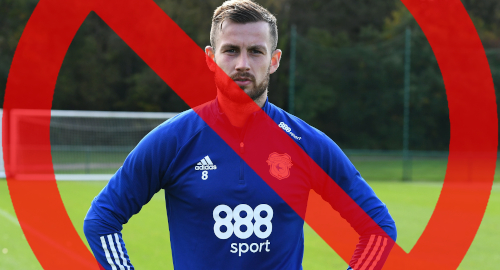 UK football fans believe gambling and betting sponsorship is out of control and the industry’s efforts to reduce kids’ exposure to gambling ads is a failure, according to a new survey.
UK football fans believe gambling and betting sponsorship is out of control and the industry’s efforts to reduce kids’ exposure to gambling ads is a failure, according to a new survey.
This weekend, UK-listed online gambling operator 888 Holdings announced a new global betting partnership with Cardiff City FC that includes the company’s logo appearing on the team’s training kit. The club’s CEO Ken Choo said he was “thrilled” with his new partner, but the club’s fans may have a distinctly different view.
A Survation online poll of 1,006 UK football fans aged 18 years or older taken last month shows 58% of respondents either somewhat or strongly agreed that there are too many football teams sponsored by gambling companies.
Interestingly, the number of those who strongly agreed with the idea that there was too much gambling sponsorship was highest (32%) in the 18-34 age demo, while those in the 55-64 bracket were twice as likely to strongly disagree (11%) than most other demos (4-6%).
A similarly large number (59%) agreed that there were too many gambling adverts in football stadiums, while 66% believe there are too many gambling ads on football TV broadcasts. Agreement was slightly higher among females than males in these categories, but not by much.
Over two-thirds (67%) of respondents agreed that the UK betting industry’s self-imposed ‘whistle to whistle’ ban on gambling adverts in sports broadcasts before 9pm, which took effect in August 2019, “has not prevented children seeing gambling brands in football.”
That view doesn’t jibe with the UK Betting & Gaming Council, which recently celebrated the effectiveness of its members’ self-imposed restrictions, claiming that the new rules had resulted in a 70% decline in the number of gambling ads viewed by youngsters. The UK Advertising Standards Authority’s most recent study also found that kids’ exposure to gambling ads was on the decline.
Regardless, the Survation poll found 47% support for preventing gambling companies from sponsoring football clubs, compared with only 32% who either somewhat or strongly disagreed that a ban was warranted. Similarly, 44% supported banning all gambling advertising, sponsorship and promotion of football versus 34% who disagreed.
Football supporters were split on whether their particular club was doing enough to help people affected by gambling harm, while 28% believed their club did enough to educate people on the potential harms of gambling versus 24% who believed not enough was being done.
Finally, in what may eventually be the survey’s biggest takeaway, 34% said they wouldn’t buy a replica jersey if it featured a gambling sponsor’s logo. This was far below the 44% who weren’t bothered by the concept of wearing kit that promoted gambling, but the potential for lost sales could prove significant motivation for any team who was on the fence about whether to either renew a deal or take on a gambling sponsor for the first time.
The survey was commissioned by the Coalition Against Gambling Ads (CAGA), an amalgamation of gambling harm reduction groups that gets its funding from Derek Webb. Webb is best known for launching the Campaign for Fairer Gambling that ultimately succeeded in reducing fixed-odds betting terminal stakes from £100 to just £2.